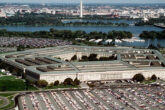February 12, 2013
Renewing America's Strategic Solvency
Foreign policy experts are likely to feel spurned when President Obama gives his State of the Union speech on Tuesday. Some may interpret the President’s focus on jobs and the economy, with only passing discussion of international issues, as declinism or retrenchment. They would be mistaken to do so.
It’s a familiar debate. Some foreign policy wonks questioned the wisdom of the President’s line—"America, it is time to focus on nation-building here at home"—in his June 2011 speech announcing the withdraw of the 33,000 so-called “surge” troops from Afghanistan. It’s a line Obama has used several times since then.
Some believed it sent the wrong signal to the world. But the president was and is correct to focus on the connection between our domestic strength and our national security. Making progress on fixing domestic issues will have far-reaching strategic effects that will make America stronger and more secure.
Over the last few years, national security leaders have started to explore this connection. Admiral Mike Mullen, former chairman of the Joint Chiefs, has famously declared the national debt the greatest threat to U.S. security. And Hillary Clinton, during her time as secretary of state, gave a series of the speeches on “economic statecraft.” But few have laid out the specific mechanisms that connect domestic vibrancy to American power.
That connection exists on two levels. First, there are the practical effects. A broad range of efforts on education, health care, infrastructure, immigration, energy and tax reform, among other issues, will bolster American competitiveness. Increased competitiveness will fuel shared prosperity and provide the innovation, dynamism and funding that underwrites America’s global role.
For example, without the world’s best scientists and engineers, the United States will slip behind its adversaries in creating and deploying the next generation of defense technologies. Not only will success in these priorities help renew American economic strength, but it will favorably position America to sustain its geopolitical preeminence even as other powers rise.
Renewing U.S. competitiveness cannot be done via isolationism--it requires a global perspective. The United States is in the midst of an energy revolution at home. According to the International Energy Agency, the nation will overtake Saudi Arabia as the world’s leading oil producer around 2017 and will become a net oil exporter by 2030. That trend will affect U.S. foreign policy as much as it does U.S. domestic policy, and the solutions must work together.
Increasing exports and trade can help create good jobs, as the president’s successful effort to double U.S. exports by 2014 has shown. Ninety-five percent of customers globally live outside the United States, according to the International Trade Association. The IMF estimates that 87 percent of worldwide economic growth will take place outside the United States.
Effective tax reform must be shaped for the global competitive environment; the same goes for infrastructure and immigration. Finding a sensible solution to unsustainable long-term debt will determine whether the U.S. dollar will remain the world’s reserve currency. Just because the solutions must come from American cities and not Baghdad, Beijing or Bamako do not make the implications any less international.
Second, solving big problems at home will have a psychological effect, helping to ease doubts about America’s staying power globally. Resolving big issues can reassure our allies and force potential adversaries to think twice about challenging the rules-based global order. The financial crisis and the contraction in the American economy fueled narratives of American decline as much as U.S. troubles in Iraq and Afghanistan.
Finally, the realities of shifting focus towards the home front hardly means isolationism. While the defense budget will go down over the next decade, the U.S. will remain the world’s pre-eminent military power by a large margin. America will retain a capability and a willingness to counter threats and defend its interests where necessary. As the National Intelligence Council wrote in its Global Trends 2030 report, “The potential for an overstretched U.S. facing increased demands is greater than the risk of the U.S. being replaced as the world’s pre-eminent political leader.”
The real threat to American power from budget cuts and inattention will stem from disproportionate cuts to U.S. diplomatic and development tools, arguably among the most cost-effective investments in American statecraft. If anything, the president should make extra efforts to preserve robust funding support for these agencies.
Power starts at home—but it doesn’t necessarily stay there. The rest of the world is watching how America will respond to the great strategic challenge posed by the need for domestic renewal. For that effort will determine the prospects for American power. So foreign policy wonks, listen up!
Shawn Brimley is Vice President and Director of Studies at the Center for a New American Security, and former Director for Strategic Planning on the National Security Staff at the White House. Jacob Stokes is a Research Associate at CNAS.
More from CNAS
-
Stock Buybacks in Defense: What Drives Them, and How That Can Change?
Lack of capital is not a problem hindering investment at the largest defense primes. The issue revolves around the capital allocation decision....
By Mikhail Grinberg, Jerry McGinn & Lloyd Everhart
-
Ukrainian president has stark new warning as war rages on
Ukrainian President Volodymyr Zelensky warns that Ukraine will lose the war with Russia without US assistance. Franz-Stefan Gady of CNAS explains why US military aid is crucia...
By Franz-Stefan Gady
-
Sharper: Maritime Security
The importance of securing the maritime domain is rapidly increasing. From the South China Sea to the Red Sea, the U.S. and its allies are experiencing escalating challenges t...
By Anna Pederson & Charles Horn
-
Innovation Adoption for All: Scaling across Department of Defense
The Department of Defense does act quickly when properly motivated and catalyzed by effective leadership....
By Robert O. Work, Michael Brown & Ellen Lord




